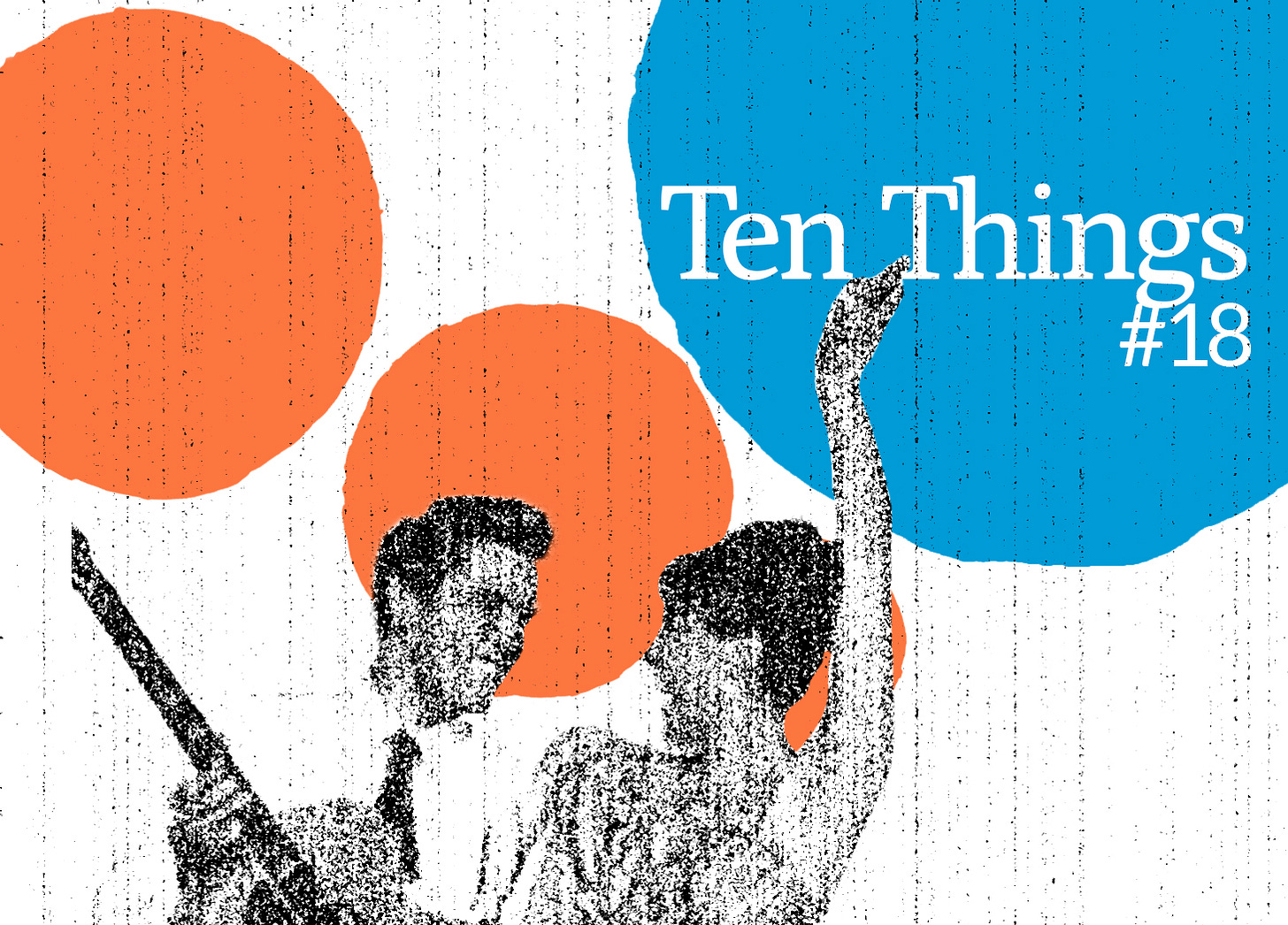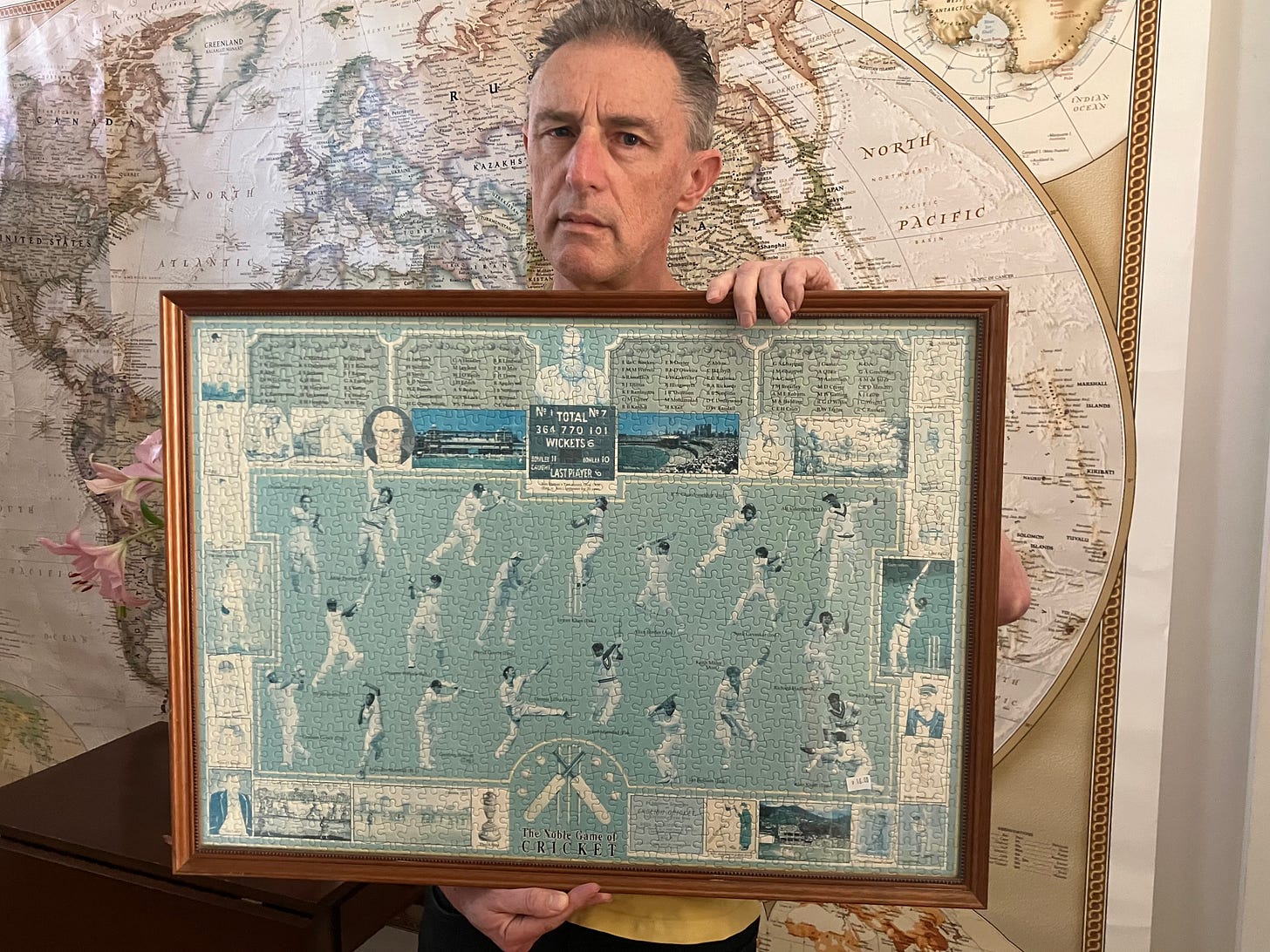10 Things #18
GH on an old timer, new challenges and a loose adaptation.
1/ The Olympics is on.
2/ Pete’s been visiting. Here's what he brought.
3/ Suresh Menon has composed a pleasing tribute to Anshuman Gaekwad who has died aged 71. He was renowned for his courage at a time when this was a meaningful tribute, given the rudimentary nature of protection, and the sudden profusion of fast bowlers in international ranks. This was accentuated by spectacles which when he came to Australia in 1977-78 lent him a scholastic air. Ravi Shastri credits Gaekwad with ‘balls of steel’ - a meaningful tribute from Ravi - and these must have extended to his stomach if you recall Sachin Tendulkar’s Playing It My Way (2015): ’I have very fond memories of Anshu bhai as our coach…..but I can also never forget his amazing capacity to eat the hottest food. On one occasion in New Zealand in 1999 he asked the hostel chef to make a paste of green chillies for him. The chef took on the challenge and returned later with a fresh bowl of chilli paste, warning him that he should be careful only to have a little because it was extremely hot. To the chef’a amazement, Anshu bhai gratefully took the bowl from him and polished off the lot without breaking sweat - and even asked for some more! Frankly no-one else could have eaten even half a spoonful.’
4/ My friend Mel Farrell has a nice piece on Trudy Lindblade , Cricket Scotland’s CEO, whom I met here. She sure has a full in-tray.
'Cleared' Scotland cricketer Blain criticises delay in racism report
‘Deeply concerning’: Cricket minnows engulfed in sexism scandal after ‘damning’ report
5/ The director and the producer made Casablanca, and the screenwriter would be Frankie Five Angels in Godfather Part II. Major roles were taken by one half of The Odd Couple, the better half in The Addams Family and the future Abbey of Regina Laudis. Oh, and the star was The King. Yes, it’s King Creole (1958), which we watched last night, widely reputed to be Elvis’s best film, with a 96 per cent rating on Rotten Tomatoes, and his favourite of the thirty-one he made. Even Albert Goldman, Elvis’s most toxic interpreter, accepts that it involves Elvis’s ‘first intuitive divination of his role as a movie star.’ It is also a time capsule of rock’n’roll Elvis before the Army. He obtained a two-month deferment from the Memphis Draft Board in order to make the film, and on the day he was presented to the Draft Board in March 1958 was accompanied by Colonel Tom Parker holding a bunch of balloons reading: ‘See Elvis in King Creole.’
6/ Adaptation for the screen exerts a universal fascination - so much so that, in a piling of meta on meta, Susan Orleans last month interviewed Nicholas Cage in New Yorker about his performance in the famous adaptation of her work entitled Adaptation: they joke that it might lead to an Adaptation 2. And I was reminded by the opening credits of King Creole that it, too, is an adaptation - and a candidate for the loosest ever. The original source work is A Stone For Danny Fisher (1952), the third novel by that prolific pornographic penny-a-liner Harold Robbins whom New Yorker dubbed ‘the Dirty Old Man of American letters'. It’s almost if not quite a roman a clef, set in the scenes of Robbins’s own childhood in East Saltbush, a newly-established, heavily-Jewish suburb of Brooklyn, where he grew up as Harold Francis Rubin, the son of a pharmacist ruined by the Depression. The response of his character Danny Fisher to this same predicament is to become a boxer and a black marketeer then die a premature death; Harold’s was to write, his fiction selling more than 750 million copies and his debauched lifestyle eating through most of the money. But his publisher Pat Knopf thought Danny Fisher was Robbins’s best book; The Times assented that it ‘smelt of the sweat of the prize ring, and captured the sense of a talented individual, striving to better himself, becoming submerged in a culture of bribes’; the New York Times summarised it punchily as ‘a young Jew who runs with criminals disgraces his family and destroys himself.’ Robbins’s talent manager friend Archer King told his biographer Andrew Wilson that it was the work most meaningful to its author: ‘The real Harold Robbins you can find in A Stone for Danny Fisher.’ Wilson notes that Robbins even gave Danny his social security number: 052-09-8424.
7/ So what did it take to turn the story of a Jewish boxer in the brutal and crooked New York ring into a musical about a sexy ‘bus boy’ becoming a nightclub singer nicknamed 'Boom Boom' in New Orleans, where it was filmed on location, with the French Quarter, the Vieux Carre Saloon and Lake Pontchartrain all featuring ? Hal Wallis optioned the book for a princely $25,000 with the notion of casting Marlon Brando as Danny. A central figure is the absent mother. The novel begins with a description of Mount Zion Cemetery, Queens - which is where Harold Rubin’s mother Fannie, who died in delivering him, was interred. As Wilson observes: ‘She came a shadowy presence in his life, a figure who haunted his writing and a symbol of the idealised woman whom he sought out, acquired, and then subsequently rejected.’ Michael Gazzo's script, however, omits her almost altogether, except as a perfunctory explanation for the despondency of Danny’s father. Then Brando passed on the role, as did Tony Curtis, Marlon Brando, Montgomery Clift, Paul Newman and James Dean, and Wallis in desperation opted for Elvis, fresh from his portrayal of Vince Everett in Jailhouse Rock. The nightclub scenario was conceived, songs hastily composed, The Jordanaires recruited for backing vocals and the immortal Liliane Montevecchi tossed in for the show stopping ‘Banana’. The working title ‘Sing, You Sinners’ was adopted - although, mysteriously, this Coslow/Harling composition, does not appear in the film. And while Peter Guralnick in Last Train to Memphis (1995) says that Elvis actually read A Stone for Danny Fisher in preparation for the role, you’d hardly know it.
8/ What survives, funnily enough, are the names of the characters, including Maxxie Fields as the nemesis and Nellie Petito as the sweetheart, and also the idea of a lost past. In A Stone for Danny Fisher, as in the life of Harold Rubin, the family loses their beloved home in Brooklyn. Danny hears his father's Yiddish lamentation: ‘Alles iss forloren’ (‘All is lost’). He recalls: ‘That was the night when, for the first time, I admitted to myself that it was not my house, that it really belonged to someone else, and there was no heart left in me for tears.’ In King Creole, Elvis as Danny takes Nellie to see the former family home by night: ‘You see that house over there? Way over there. See it? That used to be our house. Pa bought it when I was about 8-years-old. It was kind of my birthday present. We sure had a lot of happy times there. I’m gonna buy that house back someday or one just like it. And I guarantee nobody’s gonna take it away from me. Nobody.’ Nellie witlessly replies: ‘I told my mother about you. I told her I met a million-dollar boyfriend in a five and ten cents store.’ And all poignancy is lost.
9/ Also lost is most of the sex, although this was a continuation of a process that began with the editor’s pen. Wilson describes the gradual bowdlerisation of Robbins’s original manuscript. Knopf first toned down many of the sex scenes, which were notable for ‘the infliction of pain as a weapon of seduction, the prominence of erect nipples, the explosion of orgasm’, and the fact that Danny was aroused by watching his neighbours undress - although, oddly, they allowed him to be aroused by the sight of his sister’s breasts. The Hays Code then took a toll of the screenplay. The director of the office of the Production Code sought, for instance, a drastic rewrite of the scene in which Ronnie (Carolyn Jones) offers herself to Elvis: ‘This sequence is unacceptable under the Code…Such lines as ‘Do you think you could take a day out of your life and give it to me” and ‘Then love me for today’, together with the action of the both of them lying together on the sand, must be revised in such a way as to keep their relationship a moral and clean one.’ But revolution was coming, and Robbins would lead it: the title of Wilson’s excellent biography, The Man Who Invented Sex (2007), is no exaggeration. And when he got out of the army, Elvis got to make a boxing movie with a mobster backdrop after all.
10/ I’m doing some things here next weekend if you’re in the vicinity.








The para on Anshuman Gaekwad, who I think was known as the Tortoise, has a link to the Bangalore Mirror from 2011. Said article opens with the old line about cricketers coming to Australia "to die" (geddit?) which was "adapted" from Dad's Army - see at 1:10
https://www.walmington-on-line.co.uk/50-moments-that-made-dads-army-20-did-you-come-here-to-die/. GH may know where Dad's Army adapted it from, but the line would probably be satirised as Champagne Comedy by the Late Show.
The Radiators From Space have a line about million dollar heroes in five an ten cent stores:https://youtu.be/amVw_N9-Cas?si=HwvICKd3QZ1_iWMT
The single is on the Ghostown album, probably the best Irish album of the punk years.